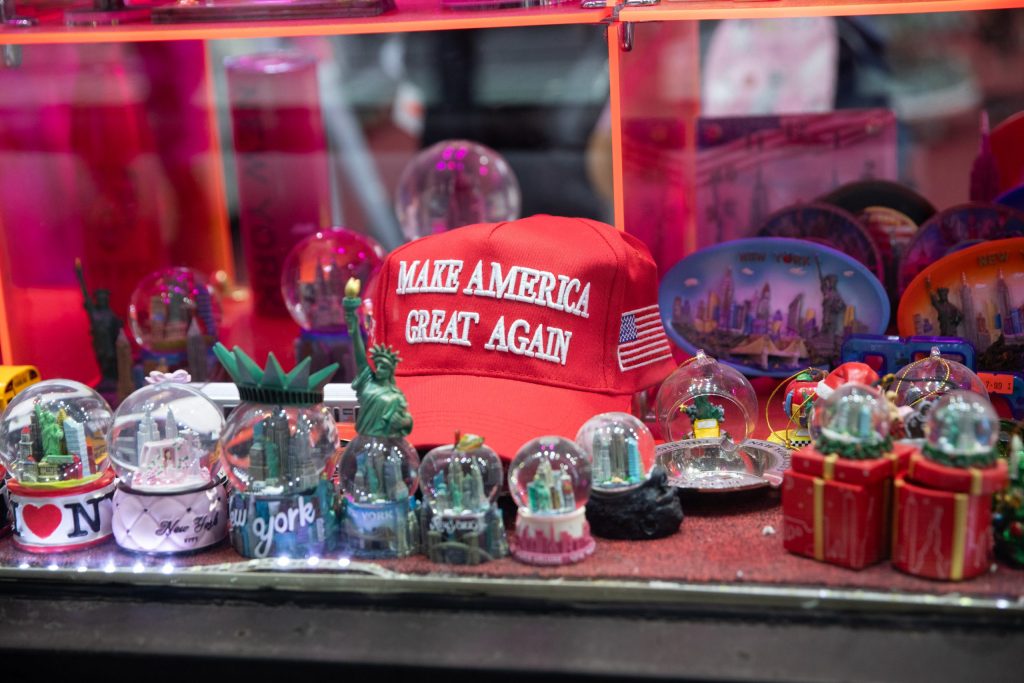Stock markets rebounded somewhat Wednesday afternoon as President Donald Trump paused his latest round of reciprocal tariffs for 90 days. Even so, New York City’s economy is expected to take a beating — and things could get even worse should Trump reignite an unprecedented global trade war.
The implications are almost impossible to overstate, say experts who specialize in the local economy.
Higher prices, even from earlier tariffs and the 125% levy still in place for China, will strain budgets, especially for less well-off New Yorkers.
And despite Wednesday’s rally, the stock market remains well below where it was when Trump was inaugurated with key securities’ businesses paralyzed by uncertainty. Wall Street accounts for more than 20% of all the income in the city and 20% of state tax revenues.
The city’s crucial tourism sector too faces the likelihood of a significant fall off.
One immediate worry: the state budget being negotiated in Albany and the city budget, which needs to be approved by the end of June, are based on outdated optimistic assumptions about the economy and tax revenues.
“The city and state economy and city and state budgets all depend on the financial sector and information technology,” said Emily Eisner, chief economist with the Fiscal Policy Institute. “This is going to be a bad year, and that’s going to take a hit on the economy and the revenue that is going to be raised from income taxes.”
It is too soon for economic data to pick up the fallout, but stories from business owners illustrate the threat, especially from the China tariff that’s still in effect.
Top 3! Games, a three-year-old Harlem-based company whose trivia games require matching songs and artists, is awaiting a shipment from China that was originally expected to cost $900 when the tariff was 20%, said founder Lyndsey McFail.
Now she is facing a bill of as much as $5,000 when the shipment arrives.
“I hope by the time our games get to the port in Maine we will not be paying 125% in tariffs,” she said.
If not, she will have to increase the current retail cost of $29.99 for the game. She thinks online and retail sales could suffer, but believes those who buy the product at music events will be willing to pay more.
Harlem-based startup Top 3! Games relies on Chinese factories to produce its trivia cards. Credit: Courtesy of Top 3! Games
For others, uncertainty is the name of the game.
“Wholesalers are trying to manage the cost increases of tariffs,” said Rahul Jain, the deputy state comptroller for New York City. “Retailers are being told what the cost will be, and retailers are deciding on how much to push on to the consumers.”
Clearly businesses are worried. A whopping 90% of businesses responding to a Manhattan Chamber survey over the weekend said that they were concerned about the tariffs.
The damage on Wall Street is clear as the selloff has sent the major stock market indexes down 20%, which would signal a dreaded bear market.
Mergers and acquisition activity, a crucial element of securities industry revenues and profits, fell sharply in the first quarter to its lowest level since 2020. Uncertainty about what will happen to tariffs and the economy generally make it unlikely companies will be willing to buy other companies or pursue mergers.
The signs for tourism have also turned bearish with Delta Airlines announcing Wednesday that its bookings have declined. New bookings to the United States from Canada, the second largest group of international visitors to New York, have declined about 20% since Feb. 1 compared with the year-ago period, according to Forward Keys, a flight ticketing data firm.
Hotel occupancy remained high in New York City in March at 83%, according to preliminary information from the industry tracker STR. But insiders say the New York City Tourism + Conventions agency is revising its 2025 forecast downward. The agency did not reply to a request for confirmation.
The first sign of the impact of tariffs might come Thursday when the Bureau of Labor Statistics releases the consumer price index, which might show the impact of the tariffs on China, Mexico and Canada that Trump announced earlier this year. Price hikes this month will be seen in the May numbers.
It isn’t likely that jobs data released next week will show any impact, with the possible exception of picking up the decline in federal jobs as a result of the DOGE efforts to shrink the government. The first signs of broader job losses could come in May, said Jain, and in the months after that.
Monthly sales tax data will show whether consumer spending is declining in response to either higher prices or economic uncertainty — or both.
The biggest sign of trouble could come in July when the state and city will report personal income tax collections for the April to June period, which will signal how much damage has been done to Wall Street.
One key question is how the state and city will respond to the economic turmoil.
For example, the budget proposals issued in May by the Democratic controlled Assembly and Senate would add $7 billion to Gov. Kathy Hochul’s $252 billion proposal. If enacted that would make the increase over the previous budget to about 7%.
Similarly, the New York City Council wants to add a little more than $6 billion to Mayor Adams’ $114.5 billion plan.
“Every day that passes by it is hard to believe rosy projections for any government that relies on Wall Street,” said Jain about the city budget. “Any revenue projection needs to be cognizant of that.”
Our nonprofit newsroom relies on donations from readers to sustain our local reporting and keep it free for all New Yorkers. Donate to THE CITY today.
The post How Trump’s Tariff Brinksmanship Could Still Pummel NYC’s Economy appeared first on THE CITY – NYC News.

